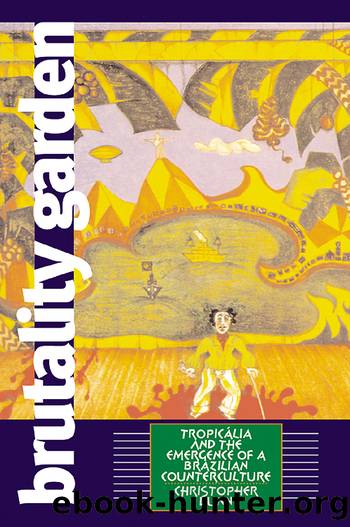Brutality Garden by Dunn Christopher;

Author:Dunn, Christopher;
Language: eng
Format: epub
Publisher: The University of North Carolina Press
Published: 2001-09-14T16:00:00+00:00
IT’S FORBIDDEN TO FORBID: FIC 1968
During the later part of 1968, the focus of tropicalist performance shifted gradually from ironic satire toward a more aggressive engagement with international countercultures. The most polemical moments of the tropicalist movement occurred during the festival season (September–November) in the second half of 1968. As described in Chapter 2, Veloso and Gil had achieved national recognition with their “universal sound” at São Paulo’s Festival de Música Popular Brasileira aired by TV Record. In 1968, they gained notoriety at the Festival Internacional de Canção (International Song Festival), also known as FIC, sponsored by TV Globo in Rio de Janeiro.
Initiated in 1966 as a Brazilian analogue to the San Remo music festival in Italy, FIC was composed of a national contest to select one Brazilian song to compete in an international competition with invited pop singers from abroad. During its first two years, FIC was upstaged by the festival of TV Record, although it did provide a venue for emerging artists such as Milton Nascimento. In 1968, FIC came of age, attracting top performers and garnering significant media attention. A series of eliminatory rounds in São Paulo and Rio de Janeiro preceded the finals of FIC III. Veloso and Gil participated in two eliminatory rounds held at the Teatro da Universidade Católica (TUCA) in São Paulo.
At that event, Gilberto Gil presented a song called “Questão de Ordem” (Question of order), which introduced stylistic elements of rock and African American soul music. At the FIC eliminatory rounds, Gil was jeered by the collegiate audience and his song was disqualified from the contest. Even critics who had praised Gil’s earlier work were critical of Gil’s new tendency. The erstwhile tropicalist crusader Nelson Motta complained that
Gil has slipped into a more African current, more identified with modern international black music, but he isn’t understood by the public, nor by me....Now with his crazyhowling, even while seeking liberty and disorder, he does not offend anyone, he does not enchant anyone, he does not move anyone, he does not overturn anything . … He only irritates....In compensation, when Gil sings his admirable “A falência do café” in which he “oswaldandradianly” ridicules the Paulista coffee aristocracy conquered by industry...everyone likes it, he crystallizes a very relevant form of expression.21
Download
This site does not store any files on its server. We only index and link to content provided by other sites. Please contact the content providers to delete copyright contents if any and email us, we'll remove relevant links or contents immediately.
Fury of Magnus by Graham McNeill(2091)
The Fine Print (Dreamland Billionaires Book 1) by Lauren Asher(1868)
The Rose Code by Kate Quinn(1620)
The Last House on Needless Street by Catriona Ward(1588)
Luster by Raven Leilani(1579)
Transcendent Kingdom by Yaa Gyasi(1569)
Moonflower Murders by Anthony Horowitz(1420)
Malibu Rising by Taylor Jenkins Reid(1374)
This Changes Everything by Unknown(1187)
The Lying Life of Adults by Elena Ferrante(1170)
The Lost Book of the White (The Eldest Curses) by Cassandra Clare & Wesley Chu(1156)
The Midwife Murders by James Patterson & Richard Dilallo(1151)
The New Wilderness by Diane Cook(1123)
Written in the Stars by Alexandria Bellefleur(1097)
Ambition and Desire: The Dangerous Life of Josephine Bonaparte by Kate Williams(1087)
The Kindest Lie by Nancy Johnson(1086)
The Lying Life of Adults by Elena Ferrante;(1055)
Every Vow You Break by Swanson Peter(1043)
Wandering in Strange Lands by Morgan Jerkins(1017)
